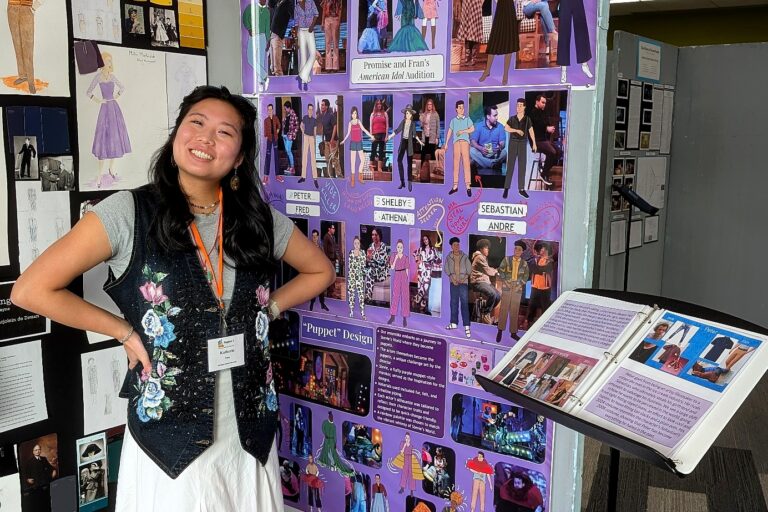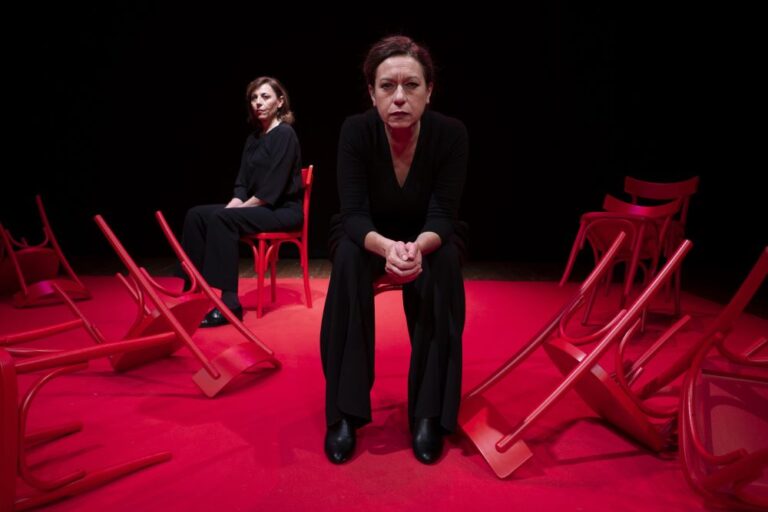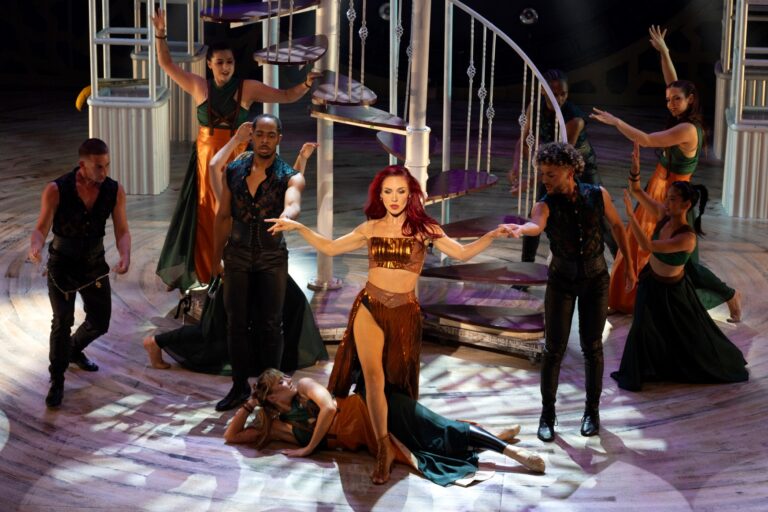Michigan State University’s Department of Theatre, in partnership with the Wharton Center Institute for Arts & Creativity, will premiere “Medusa: A New Musical Development Documentary” as part of the annual ĭmáGen program. Virtual screenings of the documentary will take place on Saturday, Nov. 7, at 7 p.m. and Sunday, Nov. 8, at 2 p.m.
The film, affectionately referred to by its creative team as a “Zoomsical Documentary,” follows Broadway actors, directors, dramaturgs, and choreographers as they collaborate with MSU Musical Theatre and Dance students and local high school actors to workshop the new musical, “Medusa.”
The musical is “new” in that it is still in its developmental phase, but the process of creating it started in summer 2016 when the show’s writers, Wes Braver and Rachel Dean, were tasked with writing 90 minutes’ worth of a musical as part of their second year in NYU’s graduate program.
We were really interested in how a woman, who was so badly wronged, was transformed into something new and how that story can be applied to modern society.
Wes Braver, co-writer of “Medusa”
Based on the original Greek myth, the musical “Medusa” is the story of a woman who tries to make her own fate in a patriarchal world. When the god Poseidon assaults her by the sea one night, she learns just how little power she holds in the supposedly free and enlightened city of Athens. Told with modern language and a darkly energetic score of hip-hop and rock, Medusa fights back against both gods and mortals as rumors fly about this angry woman with “snakes in her hair.”
“We knew we wanted a strong central female character. We started writing when the news was filled with headlines about sexual assault allegations against a lot of men in positions of great power,” Braver said. “In looking through the ancient Greek myths, we came across Medusa and her story resonated with us strongly. She’s kind of a footnote in other character’s stories, but Medusa’s origin story is a case of rape victim blaming. We were really interested in how a woman, who was so badly wronged, was transformed into something new and how that story can be applied to modern society.”

Though this story is thousands of years old, it is still being played out today, said Dean.
“We want to use the storytelling power of a musical to contribute to breaking the cycle of abuse and lack of accountability,” she said. “One thing we’re still working on is how to create a world where this story does not end tragically, but also does not have a completely happy ending because that’s not how this story would play out in real life.”
That’s where dramaturgs Shayla Gordan and Nora Alami come in. The pair have been working with Braver and Dean nearly since the show’s inception to ensure each character is multidimensional.
“Because of the subject matter of the show, having characters that are merely stereotypes could potentially be really harmful,” Gordon said. “‘Medusa’ needs to be a well-rounded musical for the purposes of harm reduction but also make it a cathartic piece of theatre for survivors of assault to watch and feel cared for.”
Being able to live in the role of Medusa helped me grow a lot as a singer, an actor, a musician, but also as a human being and as a young colored woman. It’s made me see things differently and it’s helped me walk in my greatness as a woman.
Alexia Sielo, AEA Singer and Actress
For Alexia Sielo, the professional actress playing the title role, this hasn’t been your average musical experience.
“Being able to live in the role of Medusa helped me grow a lot as a singer, an actor, a musician, but also as a human being and as a young colored woman,” she said. “It’s made me see things differently and it’s helped me walk in my greatness as a woman.”
Going into the rehearsal process, the cast and creative team really weren’t sure what the final product for this workshop would be.
“I tried not to spend too much time trying to make the Brady Bunch boxes of Zoom look interesting,” said Director and Choreographer Mayte Natalio. “My goal was to focus on exploring the songs and motifs to contribute to the students’ education and to aide in the future of the musical.”
All told, the content shared in the documentary is approximately a third of the full production.

“In selecting which parts of the show to include, we were careful to provide opportunities to engage everyone in the work,” Braver said. “We chose a number of solos to spotlight as many students as possible in featured roles and we also picked two ensemble numbers, one focused on movement and choreography, the other focused on vocal work.”
The student actors also explored the art of hip-hop, in the form of daily artist spotlights from senior Music major Lydia Carey, who worked as Music Assistant for the production in collaboration with Music Director Ian LeRoy. Referring to Medusa as a show that is “hip-hop adjacent,” LeRoy said: “For the past couple of decades, musical theatre has been tip-toeing around how to have a relationship with rap without cultural appropriation. Historically, musical theatre has been a very white-dominated art form and has not done well with representation of people of color or art made by people of color. The Medusa team and cast is working to be cognizant of how we approach the hip-hop genre, how we talk about it, and how we care for it. Hip-hop also has a complicated relationship with feminism, so it was important to find and share artists discussing the issues that Medusa is experiencing specifically as a Black woman.”
Moving the workshop to a virtual setting created both challenges and bonuses for the MSU students involved.
I’m most excited to be a part of something that documents how resilient theatre can be. Live theatre isn’t happening, but theatre is still happening.
Maya Joyce, sophomore Theatre and Astrophysics double major
“Because of the pandemic, my schedule is drastically different from when I signed up to be a part of the show, so I was nervous about being able to put in the work to do my part,” said D.J Isabella, a junior BA Theatre and Media Information double major. “But I’m also a writer for screen and stage so I’m excited to learn from people who are objectively better at that than I am.”
For many of the cast members, this is their very first experience performing at Michigan State University. The varying aspects of the production add up to something really exciting, said Mary Claire Zauel, a sophomore English Creative Writing major and Musical Theatre minor, “It’s my first MSU production and I feel like I hit the jackpot because it’s a musical, it’s emotionally empowering, and it’s a brand new show that I’m honored to be a part of creating.”
Still other students expressed joy in being able to perform again, despite the restrictions due to the COVID-19 pandemic.
“I’m most excited to be a part of something that documents how resilient theatre can be,” said sophomore Theatre and Astrophysics double major Maya Joyce. “Live theatre isn’t happening, but theatre is still happening.”
This is the 7th annual year for the ĭmáGen program, which provides a vivid learning experience for both college and high school actors by casting them alongside Broadway professionals in a new work. This will be the first digital ĭmáGen experience.
Tickets are $15 to watch this premiere event and just $10 for MSU Students. Tickets are available now through whartoncenter.com or https://tinyurl.com/imagenmedusa.


